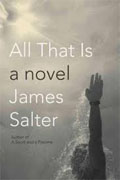All That Is
James Salter
book reviews:
· general fiction
· chick lit/romance
· sci-fi/fantasy
· graphic novels
· nonfiction
· audio books
· author interviews
· children's books @
curledupkids.com
· DVD reviews @
curledupdvd.com
newsletter
win books
buy online
links
home
for authors
& publishers
for reviewers

 |
All That Is James Salter Knopf Hardcover 304 pages April 2013 |
|
With most of its action set in the literary world of Manhattan, All That Is
Enter stylish Neil Eddins, Philip’s co-worker at a small publishing house, whose countenance somehow blends together with the naval officer Philip once was. Also entering the story is Philip’s first love, privileged, entitled Vivian Amussen, whose old Virginian family inhabits a world of horses and hunts and fine houses. As their affair begins, we soon see how Philip’s romantic paucity has painfully affected his view of women. Philip thinks he loves Vivian, but her somewhat stiff manners are the first indication that she cannot give Philip the loyalty he seems so desperately to need. Pretending to ignore Vivian’s family’s inherent self-approval, Philip tumbles into the “fragrance of married life” with its meals and holidays, “the sexual riches.” His unfolding existence gradually becomes an exploration of how love can be cast into darkness. While Vivian is a woman of uncommon beauty, she is also smart enough to not want the one man who truly loves to be her lover. Like many of us, Philip spends his time pining for what he can never have. On a trip to London, he comes under the spell of editor and friend Enid, whose brilliant smile and nakedness truly seduce Philip. There’s also beautiful Christine, who at first proves to be Philip’s emotional match yet is condemned to circle around him in a silent march of betrayal when he can’t give her the mature love she craves. Although the novel comes across as a bit retro and old-fashioned (and Philip’s constant misogyny is irritating: “we’re in the middle of the women thing: equality, in work, marriage, they don’t want to be desired unless they feel like it”), in Salter’s modern treatise the characters must somehow resolve the irresolvable. Part of Philip’s dilemma is coming to terms with his hubris. He admits he loves his work and his unhurried, defined life, and he also enjoys the comforts of marriage, where nothing suggests an excess of decay. Still, he allows himself to be drawn into a compromising situation that will have serious ramifications. Philip is completely unaware of the particular betrayal that will come his way and ends up humiliated, a “reluctant slave” to the pleasures of women. For all this emotional turmoil and existential sturm und drang of male patriarchy, Philip’s lovers are portrayed as mostly drowning in their own moral anomie, fueled by the archaic sexual politics of the time. The book's darker undercurrents gradually come to light when Philip opens himself up to criticism and then must defend the real motivations behind his own selfish wants and needs. Philip’s journeys to resolving his differences, his restive attitude deeply symbolic of his search for a combination of love and passion. Salter’s imaginative and spare use of language and his clear, declarative prose gradually win the reader over in a tone reminiscent of Ernest Hemmingway. Every element of a great Hemingway book can be seen here: vivid description; moments of strange, elegiac melancholy; the human spirit fighting against the world; loneliness, isolation, and endurance; and the very painful nature of Philip’s personal failings when he’s finally confronted with the by-products of his auspicious and fully-lived life. Originally published on Curled Up With A Good Book at www.curledup.com. © Michael Leonard, 2013 |
|
|
|
 Click here to learn more about this month's sponsor! |
|
| fiction · sf/f · comic books · nonfiction · audio newsletter · free book contest · buy books online review index · links · · authors & publishers reviewers |
|
| site by ELBO Computing Resources, Inc. | |
 Thus we are introduced to Philip, a veteran of the
war in the Pacific, forced into a diligent ship-life and its accompanying duties. Compelled by courage and the “real
danger [that] would come from the sky," Philip’s memories are grounded in the landscape formed by his loving mother, Beatrice.
War makes Philip's life more real than anything he could have imagined, and he returns a hero, eventually garnering a place at Oxford University. Until now, Philip has forgone life’s sensual connections for which he so yearns. At the same time,
he attempts to live a life of meaning and purpose, one crammed full with activity, work, and friendships.
Thus we are introduced to Philip, a veteran of the
war in the Pacific, forced into a diligent ship-life and its accompanying duties. Compelled by courage and the “real
danger [that] would come from the sky," Philip’s memories are grounded in the landscape formed by his loving mother, Beatrice.
War makes Philip's life more real than anything he could have imagined, and he returns a hero, eventually garnering a place at Oxford University. Until now, Philip has forgone life’s sensual connections for which he so yearns. At the same time,
he attempts to live a life of meaning and purpose, one crammed full with activity, work, and friendships.